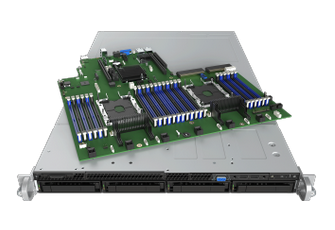Intel informed customers on Tuesday that it has patched many potentially serious privilege escalation vulnerabilities in its Server Board products.
One advisory published by the tech giant describes over 20 vulnerabilities affecting Intel Server Boards, Server Systems and Compute Modules. A majority of the flaws can be exploited for privilege escalation, and a few of them can allow an attacker — one of them can be exploited without authentication — to launch DoS attacks via local access.
The most serious of the security holes is CVE-2020-8708, a critical improper authentication issue that allows an unauthenticated attacker to elevate privileges via adjacent access. Server Boards, Server Systems and Compute Modules prior to version 1.59 are impacted.
Ten of the other flaws have been classified as high severity. They can be exploited for privilege escalation via local or adjacent access, and they are caused by buffer overflows, improper input validation, improper access control, and incorrect execution-assigned permissions in the file system.
Another advisory released by Intel for Server Board products describes two high-severity and one medium-severity vulnerabilities that can allow local privilege escalation. A third advisory describes two high-severity local privilege escalation bugs affecting Server Board M10JNP2SB before version 7.210.
Of the remaining 15 advisories published by Intel on Tuesday, five describe high-severity issues. The list includes a DoS flaw in the RAID Web Console 3 for Windows, privilege escalation in some NUC products, privilege escalation in Programmable Acceleration Cards (PAC) with Arria, privilege escalation and DoS vulnerabilities in Graphics Drivers, and DoS, information disclosure and privilege escalation bugs in Wireless Bluetooth products.
The medium-severity vulnerabilities affect Wireless for Open Source, LED Manager for NUC, Thunderbolt controllers, the Rapid Storage Technology Enterprise (RSTe) Software RAID driver, SSD Data Center Tool (DCT), Distribution of OpenVINO Toolkit, the RealSense D400 Series Universal Windows Platform (UWP) driver for Windows, the Mailbox Interface driver, and the Computing Improvement Program.
Intel recently launched an investigation after someone leaked 20GB of data belonging to the company, including technical documents and tools. The company’s initial probe revealed that the leaked information likely came from the Intel Resource and Design Center, from where it may have been downloaded by an individual who had access.
Related: Researchers Revive ‘Foreshadow’ Attack by Extending It Beyond L1 Cache
Related: New Security Tech in Intel CPUs Protects Systems Against Malware Attacks
Related: Vulnerability in Intel Chipsets Allows Hackers to Obtain Protected Data














